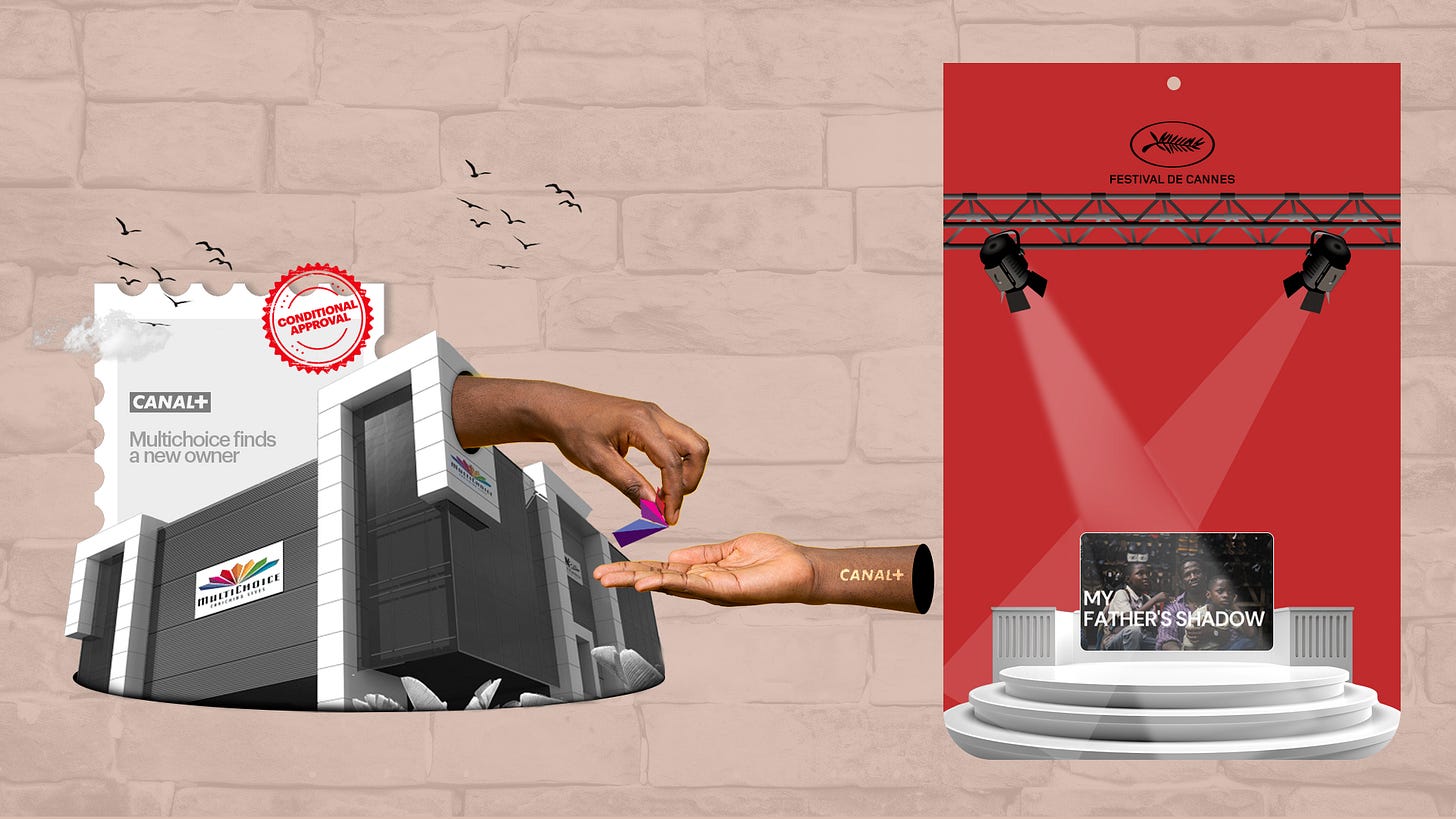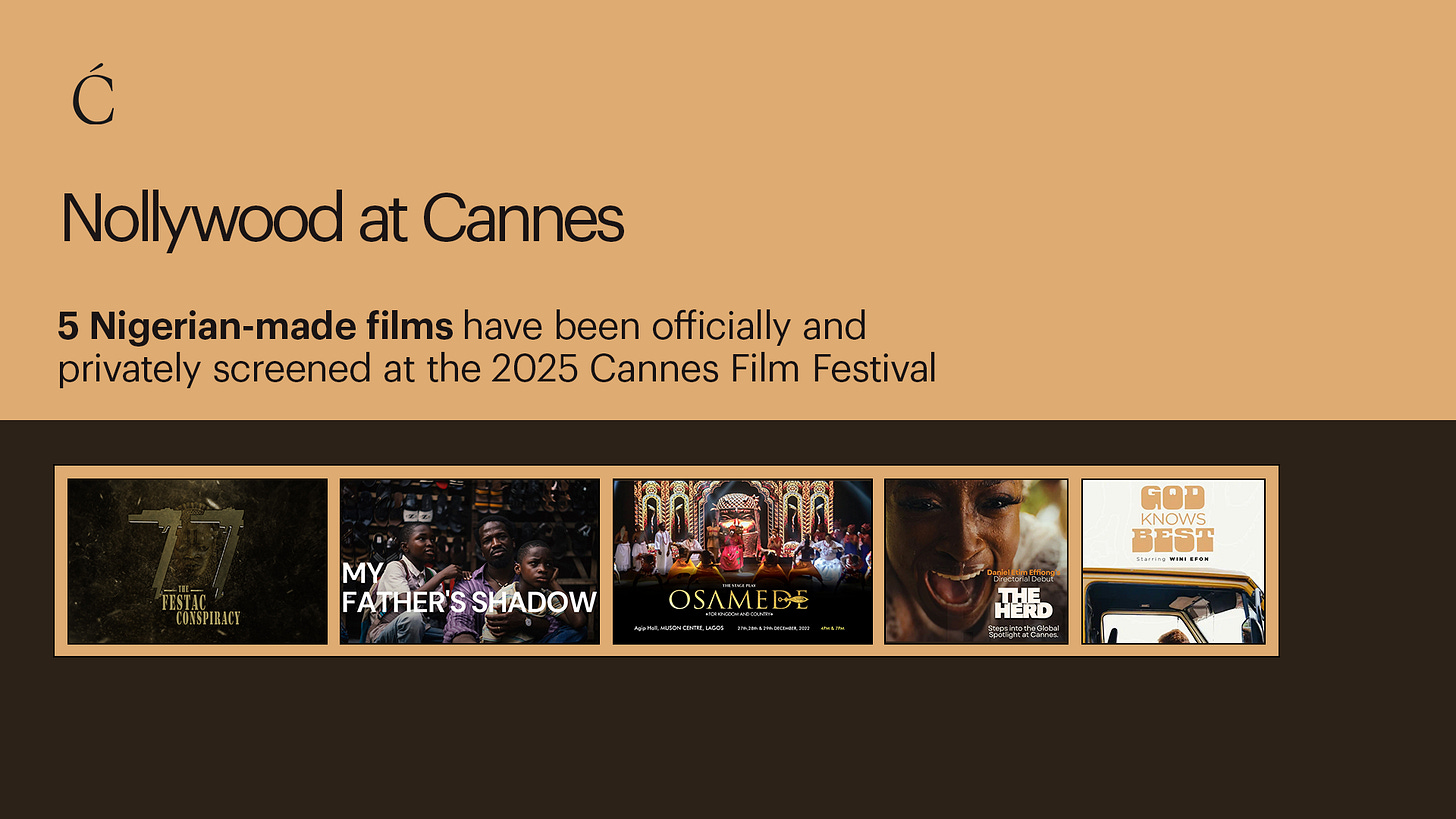Multichoice finds a new owner + Nigeria steps onto the Cannes stage
We look at Canal+’s conditional approval to acquire Multichoice and Nigeria’s film diplomacy play at the Cannes Festival.
Hello there!
This week’s digest brings some resolution, albeit not the kind you might be expecting.
In today’s Digest, we cover:
Canal+’s final takeover of Multichoice and its implications
Screen Nigeria’s launch at the Cannes Film Festival
Center Spread 🗞️
Canal+ is finally getting its Multichoice
Earlier this week, South Africa’s Competition Commission granted “conditional approval” for Canal+ to acquire Multichoice, bringing to a head a process that formally began in September 2024. According to the commission, the acquisition does not violate antitrust laws and “is unlikely to substantially lessen or prevent competition in any market.”
That said, it addresses employee and public interest concerns. For one, Multichoice will remain “incorporated and headquartered in South Africa,” and “will pursue a secondary inward listing on the securities exchange operated by the JSE Limited.”
Both Canal+ and Multichoice have also agreed that they will continue to “procure local news content for DStv” and “ensure the diversity of the news content it broadcasts.” Perhaps what is important to this approval is that Canal+ cannot cut any Multichoice jobs for the next three years, and this will put current employees at ease.
The final step in this process is for the Competition Tribunal to approve the transaction. This shouldn’t be a problem, however. So, it’s safe to conclude that Canal+ now owns Multichoice. All things considered, this is the most ideal outcome for this acquisition. The South African government has ensured that it addresses most questions and doubts that the critics raised.
What this means for the larger African media ecosystem, though, remains up in the air. (Pair this with “Communiqué 52: Canal+ has bet its future on Africa, what could go wrong?”)
Can Cannes take Nollywood global?
Nollywood is the talk of the town, thanks to a historic milestone: My Father’s Shadow became the first Nigerian film ever selected for the official lineup at the Cannes Film Festival. But the sector has more to be excited about.
For the first time since 2013, Nigeria had a unified national pavilion at the Cannes Film Village. The Nigerian government also launched its "Screen Nigeria" initiative aimed at promoting Nollywood at global film festivals.
The Screen Nigeria initiative was first announced in November 2024 as part of the Federal Ministry of Arts, Culture, Tourism, and the Creative Economy (FMACTCE)’s roadmap for film development initiatives for the country. In February 2025, Baba Agba, the special adviser to the President on Creativity and to the Minister of FMACTCE, stated the goal is to give Nollywood its own "Afrobeats moment"—a breakout into the global mainstream. And it might just be possible.
Over the past two decades, Nollywood has steadily matured in artistic and technical quality. Since 2016, Nigerian filmmakers have been making inroads at top festivals. In 2025 alone, nine Nigerian-made films have featured at four international festivals.
But this also reopens the conversation about infrastructure and financing, especially the government’s role. For Nollywood to consistently produce at this level, it needs a pipeline, just like the music industry produced Davido, Wizkid, Burna Boy, and now Asake, Ayra Starr, and Tems. So far, government funding has been limited; local and foreign private players remain the real drivers in the sector. For instance, My Father’s Shadow was shot in Nigeria, but funded by the U.K.’s BBC Films.
According to Agba, Screen Nigeria will continue at the Toronto and Red Sea Film Festivals later this year. Cannes has provided momentum. Can it be sustained?
Crunch Time 📈
Catch Up 📬
The media ecosystem has been one of the biggest victims of the digital technology revolution. Every new advance has consistently disrupted how we consume information: blogs and social media challenged newspapers; YouTube, podcasts, and audio streaming have upended TV and radio.
Now, platforms like Substack have shown that newsletters can be a viable media model in the West. But the same isn't necessarily true in Africa.
The latest Communiqué essay explores what it takes to scale newsletter businesses across the continent. Read it here.
Curiosity Cabinet 🗄️
Why more Nollywood filmmakers should embrace YouTube as a serious distribution channel.
Nigeria’s first official Cannes entry, My Father’s Shadow, delivers emotional weight with striking simplicity.
Canal+ has completed the MultiChoice takeover. (Pair this with Communiqué 52.)
Spotify’s boots-on-the-ground approach in Nigeria is paying off. (Pair this with Communiqué 56 & 09 for more context on Spotify’s strategy.)




